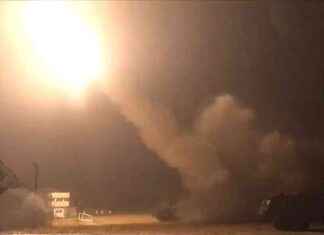The Israeli Prime Minister, Benjamin Netanyahu, was admitted to the Sheba Medical Center, near Tel-Aviv, yesterday. He felt dizzy and a quick scan determined he was dehydrated.
On Friday, Netanyahu spent a few hours near the Sea of ??Galilee, in the midst of a heat wave.
The Prime Minister released a video from the same hospital in which he said he was doing well.
Opposition leaders wished him a speedy recovery. Among them was former Prime Minister Ehud Barak, leader of the protests against the Government. “I wish the prime minister a speedy recovery, but the protests will continue tonight,” he said in a statement.
Thousands of Israelis gathered again last night in Tel-Aviv. For 38 weekends these activists have been protesting the Government’s attempt to end the independence of the judiciary in the streets. Yesterday’s march is a preview of the one that has been called for Tuesday throughout the country.
The ultra-conservative, ultra-religious and ultra-nationalist Government plans for the Knesset to approve before the end of the month a law that will prevent the Supreme Court from questioning the Government’s policies, let alone declaring them illegal.
Israel is a country without a constitution. It also does not have a bicameral parliament. Only justice can control the Executive. But now he won’t be able to do it either because the new law will determine that the Government’s actions are “benevolent” and, therefore, outside of judicial scrutiny.
Netanyahu, prosecuted for corruption, has the majority to go ahead with this reform which represents a serious setback to democracy.
As the protests demonstrate, the country is divided and tensions are rising. Supporters of the Government have organized mockery in front of the homes of the leaders of the protest movement. Police use riot squads to keep the two sides apart.
The division is worrying in the army, the most respected institution, in which hundreds of soldiers will refuse to serve if the judicial reform goes ahead.
At the same time, the confrontation with the Palestinians also worsens. The armed assault on the Jenin refugee camp at the beginning of the month left 12 Palestinians dead and 250 injured. The military forced the evacuation of 5,000 people, who were forced to leave their homes immediately. The Palestinian response came soon. A terrorist ran over several pedestrians in Tel-Aviv with his vehicle. He wounded seven before being shot down.
Violence in the occupied territories has been on the rise since Finance Minister Bezabel Smotrich, leader of the Religious Zionist Party, gained control of the area through an agreement with the Ministry of Defense. Many jurists consider handing over control of the West Bank to a civilian authority an unequivocal step toward annexation.
In 2017, Smotrich drew up a plan to “win and end” the Palestinian conflict, and for this the number of settlers must be doubled. This means going from half a million to one million, to which must be added the 250,000 who live in East Jerusalem. The extreme colonization of the territory will prevent the creation of a Palestinian state.
This year the Government has granted 12,000 licenses for new Jewish homes in the West Bank and 16,000 more in East Jerusalem. It’s a record. At the same time, it has legalized around 80 illegal settlements and has accelerated the procedures to build new colonies.
Another clear sign of the deterioration of coexistence is the vandalism and hate crimes suffered by Christians in Jerusalem. Ultra-Orthodox Jews have destroyed dozens of graves in Mount Zion cemeteries. The Jerusalem Intercultural Center has already recorded more than 20 attacks against Christians since the beginning of the year, an unprecedented number.








